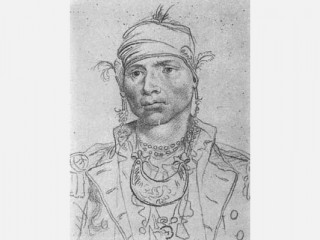
Alexander McGillivray biography
Date of birth : 1750-12-15
Date of death : 1793-02-17
Birthplace : Hoboi-Hili-Miko, Coosa River (now Montgomery, Alabama)
Nationality : American Indian
Category : Historian personalities
Last modified : 2010-11-19
Credited as : Chief Leader of Creek Indians, ,
Alexander McGillivray was the American Indian chief of the Creek nation during the period of Spanish and American rivalries for Florida.
Alexander McGillivray lived until the age of 14 at his father's trading post on the Tallapoosa River. His mother belonged to a clan of the Creek Indians and was half French; his father, a Scot, was a trader with political influence among the Creeks. In 1773 McGillivray went to Charleston, S.C., and then to Savannah, Ga., where he received a good education. He then worked in a mercantile firm and continued to study history.
During the American Revolution, McGillivray's father served the British. Because he was a loyalist, his property was confiscated, and he fled to Scotland; McGillivray returned to his mother's people. After the war, McGillivray's alliance with British traders in Spanish Florida against the Americans was of great importance, for, at his mother's death, the council chose him as their tribal leader. Soon he was called Emperor of the Creek Nation, a title he fancied.
McGillivray's goal was to form an alliance of southern Indians and use aid from England and Spain to force the United States to withdraw from Georgia, Kentucky, and Tennessee. In 1784 he signed a treaty with Spain making him a colonel on a salary of $50 per month. In return Spain would monopolize trade with the Creeks, and McGillivray was to expel the Americans.
Hating the Americans for confiscating his family's property, McGillivray began a war on the United States; battles soon were being fought from Georgia to Cumberland, Tenn. This war was so successful that in 1787 a congressional agent visited McGillivray. Possibly the Creek chief suggested that the Creeks be organized and admitted as a state. That same year the Spaniards stopped supplying munitions to McGillivray. This supplying resumed in 1789, but the Spaniards never fully trusted him again.
With the organization of a stronger U.S. government, President George Washington sent agents to negotiate with the Creeks. The first attempt failed. But in 1790 McGillivray was persuaded to journey to New York City; there he repudiated his treaty with Spain and signed an agreement with the United States ceding some Creek lands and making him a brigadier general with pay of $1,200 per year. With his income McGillivray became owner of three plantations and 60 slaves.
Soon after his return from New York, McGillivray made a new agreement with Spain repudiating the Treaty of New York; he received $2,000 per year from the Spaniards (raised later to $3,500 annually). On Feb. 17, 1793, while negotiating with the Spaniards to raise another Indian confederation to oppose the United States, he died of a fever.
The best work on McGillivray is John Walton Caughey, McGillivray of the Creeks (1938). Other details may be secured from John Pope, A Tour through the Southern and Western Territories of the United States (1792), and David H. Corkran, The Creek Frontier, 1540-1783 (1967).
















